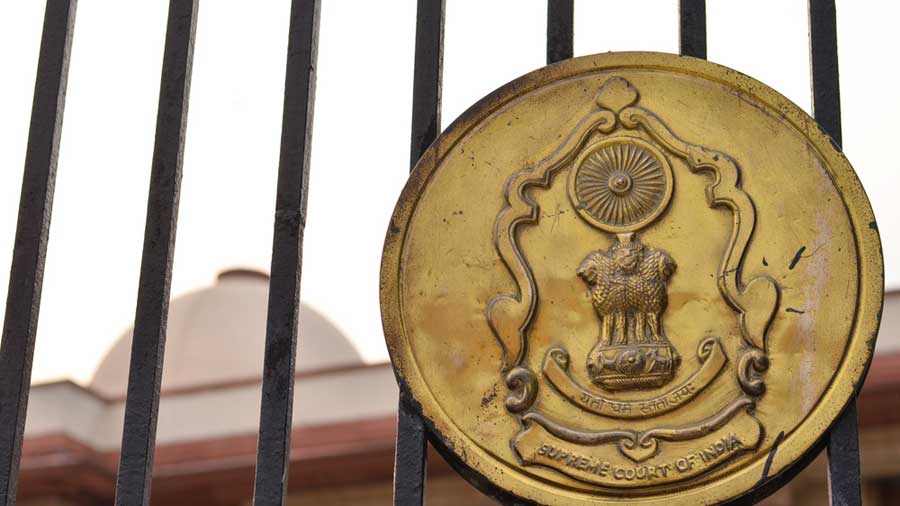The CBI has withdrawn from the Supreme Court a petition challenging the house arrest of four Bengal politicians in the Narada case on a day the apex court raised several questions about related events in Calcutta High Court.
The following are the key observations made by the Supreme Court bench of Justices Vineet Saran and Bhushan Ramkrishna Gavai on Tuesday:
⚫ Should Calcutta High Court have decided late at night to stay the bail granted to the four accused (ministers Subrata Mukherjee and Firhad Hakim, MLA Madan Mitra and former mayor Sovan Chatterjee)?
“We have seen special hearings to deal with personal liberty. But this is the first time we are seeing that they are being used to take away liberty,” Justice Gavai said.
On May 17, a Calcutta High Court bench headed by acting Chief Justice Rajesh Bindal had started hearing the CBI plea at 8.20pm. By then, the trial court had granted interim bail to the four accused who were arrested by the CBI in the morning. The high court hearing continued till 9.45pm and the order staying the interim bail was pronounced at 10.30pm.
⚫ Can only those chargesheeted tamper with evidence, and not the other accused who are yet to be charged? “There are two sets of accused, one against whom chargesheet is filed and one against whom chargesheet is not filed. Who has the ability to tamper with the evidence?” the apex court bench asked.
The top court did not take any names. The CBI is yet to chargesheet Suvendu Adhikari and Mukul Roy, two other accused who are now in the BJP. Three of the arrested leaders are with Trinamul while the fourth, Chatterjee, had distanced himself from the BJP just before the elections.
⚫ Justice Gavai observed that he had never come across an instance when such a split verdict had been passed by a bench while dealing with a bail. Either bail is granted or denied. But the order is always unanimous, Justice Gavai said, to which Justice Saran agreed. Justice Gavai is scheduled to become the Chief Justice of India on May 14, 2025.
In Calcutta High Court, Justice Bindal was against granting bail while the brother judge, Justice Arijit Banerjee, was in favour of bail. Following the difference of opinion, a five-judge bench is now looking into the issue.
⚫ Justice Gavai refused to buy the argument of solicitor-general Tushar Mehta, appearing for the CBI, that the special CBI court had initially granted bail to the accused because of a siege of the court premises by the state law minister and Trinamul workers.
“We feel that our judiciary, including our district judiciary, cannot be influenced by mobs. We don’t want to demoralise our judiciary across the country,” the Supreme Court bench said.
Justice Gavai recalled his own experience as a high court judge in the Aurangabad bench of Bombay High Court while dealing with a rape case.
Justice Gavai recounted: “We also have been tried to be pressurised. I was hearing an anticipatory bail plea in Aurangabad in 2013 and some mahila morcha people had gathered in large numbers. The city police commissioner met me and requested that I should not pass any orders in the open court, saying that otherwise there would be a law and order problem. I told the police commissioner ‘I will pass the order in the open court. Law and order is your duty.’”
⚫ Justice Gavai hastened to add that the bench, by no stretch of the imagination, was approving the alleged conduct of the chief minister at the CBI office or the law minister leading a mob to the special CBI court that granted bail to the four accused.
“We are making it very clear that we don’t approve the dharnas. But if the chief minister or the law minister takes law into their hands, should the accused be made to suffer? You can proceed against those persons who have taken the law into their hands,” Justice Gavai said.
He added: “We don’t want to mix the issue of personal liberty of citizens with the illegal acts of some politicians.”
As the top court gave enough indication that it would not interfere with the ongoing hearing by the five-judge bench of Calcutta High Court, the CBI sought to withdraw its special leave petition challenging the high court order to free the accused from judicial custody and put them under house arrest.
The Supreme Court granted the plea and clarified that it was not making any observations or orders on the merits of the case.











